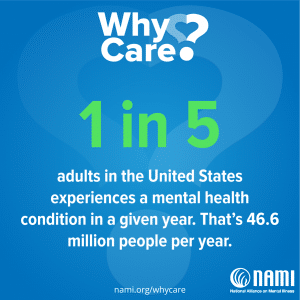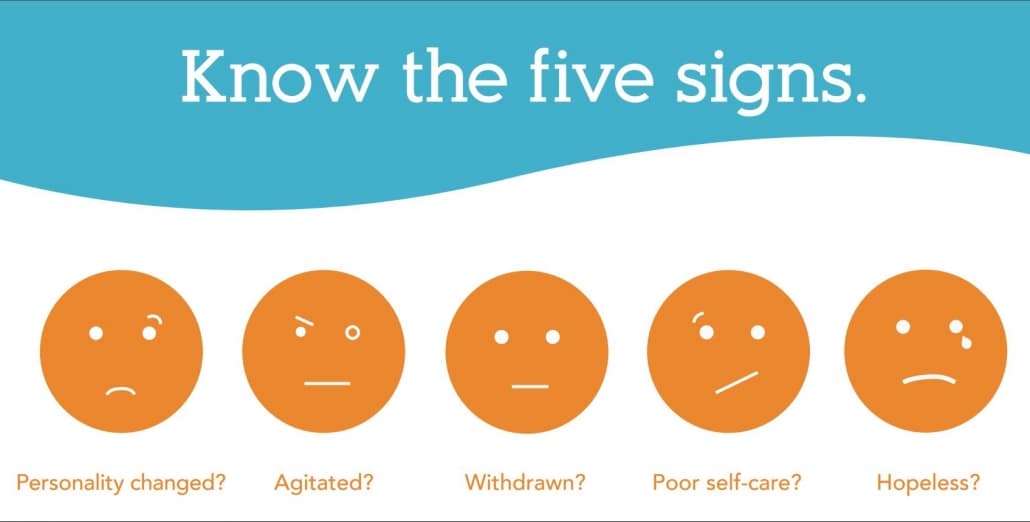You Asked and We Answered: FAQs on Mental Health
By: Vikil Girdhar, MD
Your questions, our answers!
May is Mental Health Month, which is a month devoted to raising awareness and fighting stigma around mental health. Below are answers to some of the most common FAQ’s regarding mental health, as well as common mental illnesses and treatment options.
What does it mean to have a mental illness?
Mental illnesses are health conditions that impact a person’s thoughts, emotions, relationships and daily functioning. They are often related to anxiety, grief, sadness or other distress, and usually a struggle to continue the regular activities of daily life. There is a wide variety of mental illnesses; some are rather mild and only have small effects on certain areas of life. Others can be severe and have large impacts on daily life. Some of the more serious illnesses include major depression, schizophrenia and bipolar disorder.
Who does mental illness affect?
On average, mental illness affects one in five adults in the U.S. Mental illness does not discriminate; they can affect anyone, regardless of gender, age, income, social status, ethnicity, religion, sexual orientation or background. While anyone can have a mental illness, the young and the old are more likely to be affected. 75 percent of mental health conditions develop by the age of 24 (NAMI).
Is there a cause for mental illness?
There is not an exact reason or cause for mental illness, but research points to a mix of genetic, biological, psycho-social and environmental factors as being the cause of most conditions.
Mental illness can run in the family. Genetics have a part in the development of a mental health disorder. If a parent, sibling or grandparent struggled with a disorder, then that person’s genes may make them more likely to experience mental health symptoms like depression or anxiety, or to develop a personality disorder. Also, if a person was raised in a family where one or more members is living with an untreated mental health disorder, it may cause them to pick up those behaviors and be less likely to get treatment later (NAMI).

Are there any warning signs of mental illness?
Yes, there are many different signs and symptoms of mental health disorders that will vary depending on the type of condition. Some of the general symptoms are below:
In adults:
• Confused thinking or problems concentrating
• Long-lasting sadness or irritability
• Extreme mood changes
• Excessive fear, worrying or anxiety
• Avoiding friends and family
• Dramatic changes in eating or sleeping habits
• Feeling tired and low energy
• Strong feelings of anger
• Delusions or hallucinations (seeing or hearing things that are not really there)
• Unable to carry out daily activities or handle daily problems and stress
• Thoughts of suicide
• Denial of obvious problems
• Many physical problems without obvious causes (such as headaches, stomach aches, vague and ongoing “aches and pains”)
• Abuse of drugs and/or alcohol
• A very strong fear of weight gain or concern with appearance
In younger children:
• Changes in school performance
• Excessive worrying or anxiety
• Hyperactive behavior (constant activity, unable to concentrate, fidgeting, wandering, talking too much)
• Frequent nightmares
• Persistent disobedience and/or aggressive behavior
• Frequent temper tantrums

Know the Five Signs of Mental Illness – Image Credit: Beach Cities Health District
What are some of the most common types of mental illnesses or disorders?
There are many types of mental illnesses. Below is a list of some of the more common conditions.
• Anxiety and panic attacks: Anxiety is a normal emotion, but it becomes a mental health problem when someone feels this way all or most of the time.
• Bipolar disorders: Bipolar disorder is when someone experiences extreme mood swings with periods of low (depressed) and high (manic) moods.
• Depression: Depression is when someone is experiencing a low mood, loses interest in activities, finds it hard or impossible to have fun or enjoy their lives.
• Eating disorders: An eating disorder is a diagnosis given to someone who has unhealthy thoughts, feelings and behavior about food and their body shape.
• Personality disorders: If someone has a personality disorder, some parts of their personality might affect them in a way that makes it very hard to cope with day to day life, especially when it comes to relationships.
• Obsessive-compulsive disorder (OCD): Obsessive-compulsive disorder is when someone has uncontrollable reoccurring thoughts and behaviors that they have an urge to repeat over and over.
• Post-traumatic stress disorder (PTSD): Post traumatic stress disorder (PTSD) is a diagnosis given to people who develop a certain set of symptoms following a traumatic event. Symptoms can include flashbacks, nightmares and severe anxiety, and uncontrollable thoughts about the event.
• Psychosis: A person experiencing psychosis sees the world in a different way to compared to those around them, including hallucinations, delusions or both.
• Schizophrenia: Schizophrenia is a severe mental disorder that affects how someone thinks, feels and behaves. Often the person is out of touch with reality, has disorganized speech or behavior, and pulls away from daily activities.
• Self-harm: Self-harm is when someone purposely hurts themselves, usually in order to deal with intense feelings.
• Suicidal Feelings: Suicide is when someone intentionally takes their own life.
What types of treatment are available?
Different treatment options are available for mental illnesses. Treatment works differently for different people, so it is important to find what works best. Medications can play an important role in recovery from a mental health disorder because they help manage symptoms. There are also many options that do not include medication, such as:
• Cognitive and behavioral therapies
• Support groups
• Family therapy
• Yoga
• Exercise
• Meditation
• Acupuncture and acupressure
• Bodywork and massage
• Herbal supplements
• Aromatherapy
Can people with a mental illness recover?
Most people with a mental health condition can get relief from their symptoms by taking part in a treatment plan. An effective treatment plan may include medication, psychotherapy and peer support groups. Different mental illnesses have different treatment plans, so it is critical to talk with a doctor or medical professional. A healthy diet, exercise and sleep can also have a large effect on mental health. Early identification and treatment are important factors for recovery. Many people with mental illnesses who are diagnosed and treated respond well, although some might have some symptoms return. Even so, with careful monitoring and management of the disorder, it is still possible to live a fulfilled and productive life.
If someone feels better after taking medication can they stop taking it?
People often do stop taking their medication when they feel their symptoms are under control. Others decide to stop taking their medication because of its side effects, and they don’t realize that most side effects can be managed. While it may seem reasonable to stop taking the medication, the problem is that most often, the symptoms will return. It is very important that the person works with their doctor before making decisions about any changes in their treatment or medication.
Another problem that can happen with stopping medication, is that withdrawal symptoms may start that can be very unpleasant. When coming off medication, the doctor will reduce the dosage of medications so that these symptoms don’t occur. If there are side effects that make someone unwilling to continue treatment, then they need to talk with their doctor. The doctor will work with them to reduce these side effects or will create a plan for switching to a different treatment that will be a better fit.
Are there support groups for people with a mental illness?
Yes! Many people find support groups to be a helpful in their recovery. There are a variety of organizations that offer support groups for patients, their family members and friends. Some support groups are peer-led, while others may be led by a mental health professional.
What should I do if someone I know appears to have the symptoms of a mental disorder?
If you know someone who is having problems, don’t assume that it will take care of itself and go away. Let them know you care and that there are treatment options that can help them. Talk with a mental health professional or counselor if you think someone you know is experiencing symptoms of a mental health condition. It is not an easy conversation to have, and sometimes one of the symptoms of the disorder may be that the person doesn’t know the problems for what they are, but rather thinks others are the problem. This makes it harder to help them look for treatment and puts many families in a difficult situation when it comes to helping a loved one heal. If the family feels the person will see reason, then an intervention can be a helpful way to connect a loved one with treatment. Families are encouraged to:
• Choose a few concerned, balanced family members who all agree the goal is to help the person get treatment.
• Sign the person up for treatment before the intervention to make sure that person can immediately begin treatment after the intervention.
• Remain calm, don’t judge and focus only on helping the person realize they need treatment.
REFERENCES
“Mental Health Conditions.” National Alliance on Mental Illness, https://www.nami.org/learn-more/mental-health-conditions
“Frequently Asked Questions About Mental Illness.” The Kim Foundation, https://www.thekimfoundation.org/faq.html
“Frequently Asked Questions.” National Alliance on Mental Illness, https://www.nami.org/FAQ
“FAQ: Mental Health.” Sunrise House, https://sunrisehouse.com/frequently-asked-questions/mental-health/
“Know the Warning Signs.” National Alliance on Mental Illness, https://www.nami.org/Learn-More/Know-the-Warning-Signs
“Types of Problems.” Time to Change, https://www.time-to-change.org.uk/about-mental-health/types-problems
“Frequently Asked Questions.” Mental Health America, https://www.mentalhealthamerica.net/faqs


